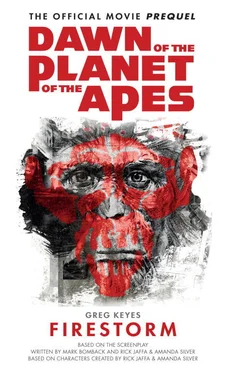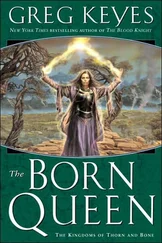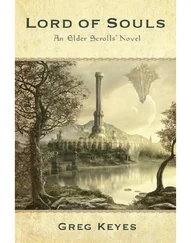Like a lot of things—and people—involved in Monkeygate.
After they had escaped San Bruno, the apes seemed to have split into two groups. One went to Gen Sys and busted it up, freeing all of the apes located there. The other bunch engineered the breakout at the zoo. Then they all had stampeded through town, converging at the Golden Gate Bridge.
How would the apes at the shelter have known where Gen Sys was?
Which brought him back to Rodman, who clearly had owned a chimp of his own. One of the test subjects maybe. He checked through the Sentinel ’s police reports, looking for anything to do with apes, monkeys, or chimps—cross-references that also mentioned Rodman. And after a bit of digging, he found what he was looking for.
Rodman’s chimp had bitten one of his neighbors, charges had been pressed, and the animal had been removed to the San Bruno shelter. So there was the first connection to Gen Sys—an ape owned by a lead scientist there was in San Bruno, where Monkeygate presumably began. The second was that the escaped apes had gone back to Gen Sys. The third was that Steven Jacobs—the man in charge of the Gen Sys labs—had died in a helicopter accident, along with the San Bruno police chief.
Now the fourth connection—according to Clancy—was that the parent company of Gen Sys was using a military contractor it also owned to clean up what was left of the apes. Clearly they were still trying to protect themselves from something. Something other than a bunch of escaped primates.
He looked over Clancy’s list of file names again. At first glance, he still didn’t see anything, but he checked again, just to be sure. Reading them aloud.
When he came to RV113 he stopped. Was that familiar?
It was somehow. He did an Internet search on it, but what came up was something by a composer named Vivaldi, which probably wasn’t what he was looking for. So he went back though his typed notes. A search through them didn’t turn up anything, but then he remembered a letter-number combination, and so a quick breeze-through found it.
ALZ112.
That was disappointing. The letters were wrong, and the number was off by one. But what if they were part of a sequence?
He had assumed that the ALZ stood for Alzheimer’s, since that was what Rodman had been trying to cure. Presumably there had been an ALZ110, and an ALZ111. In theory there would be no ALZ113, because he had stopped the research after his big failure. But—again—what if he hadn’t? What if he had carried on?
Yet why change the ALZ to RV? What could RV stand for?
No, he had to be barking up the wrong tree. It was all a series of coincidences—his reporter’s brain was trying to find a pattern that wasn’t there.
He went and got a beer, cracked it open, and turned on the news. Then he checked the phone, and found that it had taken the charge. He started scrolling through its record of calls. The last recorded call was from several days ago, presumably around the time when the battery called it quits. It was from someone name Linda Andersen.
He turned down the sound on the TV, pulled out his cell phone, and dialed the number. It rang and then went to messages.
“Hi, Linda,” he said. “My name is David Flynn, and I’m a reporter from the San Francisco Sentinel . I have some questions I’d like to ask if you have the time. Don’t worry. They aren’t personal.”
He hung up. Another long shot. She was probably Rodman’s cleaning lady or something.
He turned the sound back up and took a drink of the beer, flipping through the channels in the vague hope of finding something mindless to watch. Instead he ended up being arrested by the weird smile of Jean Vogel, a prominent pundit with strong religious views and apparent aspirations to the US House of Representatives.
“…a deliberate misreading of what I said,” she was saying. “People like to take me out of context. But I’m all about context.”
“Then when you said that the Federal Government shouldn’t be providing aid to such cities as San Francisco and New York,” the show’s host responded, “are you telling me you didn’t mean it?”
“As I said , Brett,” she said, again smiling her strange, unfriendly smile, “that statement, taken out of context, makes no sense.”
“Well, would you care to contextualize it for me then?”
“I would be delighted to, Brett,” Vogel replied. “I say that this disease is a local problem, to be solved by the state and local governments. Because if you look locally, where is this disease located? Not in Montana. There are only three cases there. Or Oklahoma—two verified instances. Mississippi, none at all. You can go down the list. These are all places where real Americans love God and fear him, where they do not pass laws allowing the ungodly union of homosexuals. These places are being spared. These places have the mark on their lintel that the angel of death passes by .”
“Then do I understand you to say that San Francisco and New York have been singled out by God because they recognize marriage equality?” the reporter said. “That this plague is his punishment?”
“Amongst other things, Brett. My point is, they brought this upon themselves. It is their problem. There’s no reason that the tax dollars of decent, hard-working Americans—citizens with real values—should pay to salvage Sodom and Gomorrah.”
“But Ms. Vogel,” the host protested, “the disease has spread to many other places. Paris, for instance—”
“Don’t even get me started on the French,” she said. “It only proves my point.”
“But it’s well known that diseases like this spread most quickly in densely populated areas with national and international hubs of transportation. The places you mention are mostly rural—”
“Is it?” Vogel countered. “Is that really ‘well known’? Or is this just more of the same propaganda from the liberal secular scientists who tell us that we came from monkeys? Look, here’s some science, if you dare to hear it. The first warning was AIDS. It was a shot right across our bows, as clear a message as anyone could want. And yet look how it was ignored.” She leaned forward. “AIDS was a retrovirus. The current plague is a retrovirus. This is how God works his will.
“I have it on very good authority,” she continued, “from a prominent archaeologist, that the plague of the firstborn in ancient Egypt was a retrovirus—”
“That’s enough.” David sighed, changing the channel again, this time to a cooking show. He drank his beer and listened to some guy talk about brisket.
Then he sat up.
“Oh, shit,” he said aloud.
RV113.
Retrovirus 113.
Implying there had been a 112. What exactly had been in ALZ112? He knew viruses were sometimes used in gene therapy…
The phone rang, and he jumped. He picked it up, hoping it was Linda, but the number was unfamiliar.
“Hello?” he answered.
There was a long pause.
“Is this David Flynn?” It was a woman’s voice.
“Linda?”
Another pause.
“No,” the woman said. “Linda died. Of the virus.”
“Oh. I’m so sorry to hear that,” he said. “I’m sorry for your loss.”
“She was my sister, Mr. Flynn. May I ask what you wanted to speak to her about?”
“I’m trying to find out some information about a man named Will Rodman.”
“He was Linda’s team leader,” she said. “At Gen Sys.”
He paused, not quite sure what to ask next, but the woman on the other end of the line spoke first.
“I’m just not sure,” she said. “I don’t know if I can trust you.”
He took a mental deep breath, and plunged right in.
“Is this about ALZ113?” he asked.
Читать дальше












